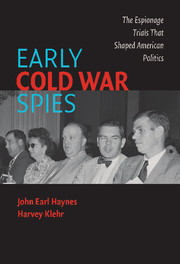Book contents
- Frontmatter
- Contents
- Series Editor's Foreword
- 1 Introduction: Early Cold War Spy Cases
- 2 The Precursors
- 3 Elizabeth Bentley: The Case of the Blond Spy Queen
- 4 The Alger Hiss–Whittaker Chambers Case
- 5 The Atomic Espionage Cases
- 6 Judith Coplon: The Spy Who Got Away with It
- 7 The Soble-Soblen Case: Last of the Early Cold War Spy Trials
- 8 Conclusion: The Decline of the Ideological Spy
- Index
- References
8 - Conclusion: The Decline of the Ideological Spy
Published online by Cambridge University Press: 05 June 2012
- Frontmatter
- Contents
- Series Editor's Foreword
- 1 Introduction: Early Cold War Spy Cases
- 2 The Precursors
- 3 Elizabeth Bentley: The Case of the Blond Spy Queen
- 4 The Alger Hiss–Whittaker Chambers Case
- 5 The Atomic Espionage Cases
- 6 Judith Coplon: The Spy Who Got Away with It
- 7 The Soble-Soblen Case: Last of the Early Cold War Spy Trials
- 8 Conclusion: The Decline of the Ideological Spy
- Index
- References
Summary
Although espionage trials continued to fascinate Americans well into the twenty-first century, by the 1960s the nature of the defendants had changed considerably. The spy trials of the early Cold War had featured defendants motivated by some animus against capitalism or loyalty to communism. By the 1960s the day of the ideological spy was gone, replaced by the greedy or disgruntled or blackmailed malcontent, whose betrayal of his country had its origins in personal crises or anger. Aldrich Ames, Robert Hansen, John Walker, and many others did enormous damage to American security but not because of their adherence to some abstract set of beliefs.
There were occasional exceptions. Larry Wu-tai Chin, a Chinese-born naturalized American citizen, worked for decades as a translator for the CIA's Foreign Broadcast Information Service. At some point, however, he became a spy for the Chinese Communist government, apparently motivated by ethnic loyalty. A defecting Chinese intelligence officer identified Chin as a Chinese agent in 1985. He confessed and was convicted of espionage in 1986 but committed suicide before his sentencing. Kurt Stand and Theresa Squillacote, former college New Left radicals motivated by revolutionary Marxist beliefs, were identified as spies for Communist East Germany when the CIA obtained records of that regime's intelligence service, the “Stasi,” after the collapse of the German Democratic Republic. A handful of Cuban spies motivated by a combination of Cuban nationalism and Castroist ideology have been arrested in recent years.
- Type
- Chapter
- Information
- Early Cold War SpiesThe Espionage Trials that Shaped American Politics, pp. 230 - 242Publisher: Cambridge University PressPrint publication year: 2006

